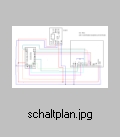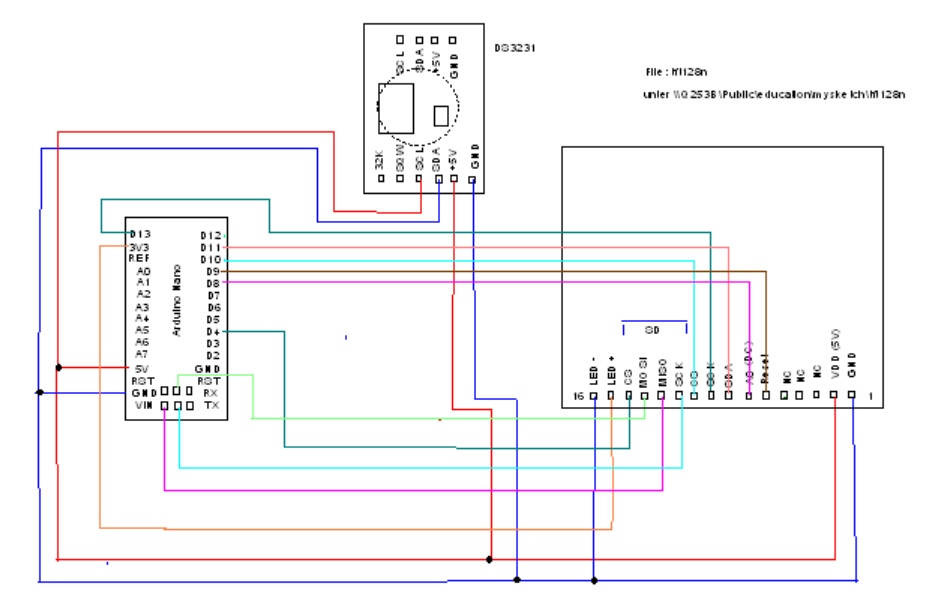2014-03-04
Step 1: buy a lot of DS18x20 temperatur sensors


// c001
/* ***************************************
* letzte Ändeung 08.10.14; SCL 29.06.21, 02.07.21
Funktionen
1. TFT mit 16 Pin Ansteuerung
2. SD-Karte lesen und schreiben ok
3. RTC Zeit setzen und auslesen https://wolles-elektronikkiste.de/ds3231-echtzeituhr
4 Taster für Funktionen auslesen
* Testaufbau
* mit Arduino UNO Ausgabe an TFT 1,8 Zoll Display 128 x 160 neu
* Grundlage ist das Testprogramm spitftbitmap von
* Limor Fried/Ladyada Written for Adafruit Industries.
************
******************************************* */
// #include
// #include
#include // Core graphics library
#include // Hardware-specific library
#include
#include
//#include // Einbinden der OneWire Library
#include "RTClib.h" // RTC-Bibliothek einbinden
/*
TFT Pin Arduino Nano
1 GND GND
2 VCC +5V +5V
3 NC (not connected)
4 NC
5 NC
6 s Reset 8
7 gr A0 9
8 s SDA 4
9 ge SCK (SCL) 11
10 b CS 7
11 gege SCK SD + TFT 9(SCK) 13 7
12 w MISO SD 12
13 ss MOSI SD + TFT 8(SDA) 11
14 ge CS SD 4
15 ge LED + über 330 Ohm an +5V
16 b LED - GND
*/
// TFT display and SD card will share the hardware SPI interface.
// (Serial Peripheral Interface)
// Hardware SPI pins are specific to the Arduino board type and
// cannot be remapped to alternate pins. For Arduino
// Uno, Duemilanove, etc.,
// pin 11 = SD-MOSI(13)+ TFT-SDA (8) (ICSP-4 (mega2560))
// pin 12 = SD-MISO (ICSP-1 (mega2560))
// pin 13 = SD-SCLK + TFT-SCL (ICSP-3 (mega2560))
// pin 20 = SDA für RTC (mega2560) (SDA UNO NANO = Pin A4)
// pin 21 = SCL für RTC (mega2560) (SCL UNO NANO = Pin A5)
#define SD_CS 4 // Chip select line for SD card
#define TFT_CS 10 // Chip select line for TFT display
#define TFT_DC 8 // Data/command line for TFT
#define TFT_RST 9 // Reset line for TFT (or connect to +5V)
//#define DS1307_I2C_ADDRESS 0x68 // the I2C address of Tiny RTC
#define RTC_I2C_ADDRESS 0x68 // I2C Adresse des RTC DS3231
RTC_DS3231 rtc;
// Option 1 (recommended): must use the hardware SPI pins
// (for UNO thats sclk = 13 and sid = 11) and pin 10 must be
// an output. This is much faster - also required if you want
// to use the microSD card (see the image drawing example)
Adafruit_ST7735 tft = Adafruit_ST7735(TFT_CS, TFT_DC, TFT_RST); //uno
// Option 2: use any pins but a little slower!
//uno-nano
//#define TFT_SCLK 13 // set these to be whatever pins you like!
//#define TFT_MOSI 11 // = TFT Punkt 8 = SDA set these to be whatever pins you like!
//mega
//#define TFT_SCLK 20 // set these to be whatever pins you like!
//#define TFT_MOSI 21 // = TFT Punkt 8 = SDA set these to be whatever pins you like!
//Adafruit_ST7735 tft = Adafruit_ST7735(TFT_CS, TFT_DC, TFT_MOSI, TFT_SCLK, TFT_RST); //mega??
#define b_plus 6 // schalter für plus
#define b_minus 3 // schalter für minus
//Declaration + Pinbelegung
//Farben bei Greentab
const uint16_t Blue = 0xF800;
const uint16_t Red = 0x001F;
const uint16_t Green = 0x07E0;
const uint16_t Cyan = 0xFFE0;
const uint16_t Magenta = 0xF81F;
const uint16_t Yellow = 0x07FF;
const uint16_t White = 0xFFFF;
const uint16_t Black = 0x0000;
// Bei REDTAB Rot und Blau sowie Gelb und Cyan vertauscht
File myFile;
long w_dog;
char myrel[] ="TFT128n Build 0.03 ";
char txt5[] = "Kartenfehler: halt";
char txt6[] = "pruefen danach Reset";
int taste_plus = 1;
int g_mode = 0; //global mode
boolean tore = false; // Recording Zeit oder Ereignis ausgelöst
int c_minute = 0;
//int t_d[6] ={11,1,1,17,1,2013}; //zeit eeprom ab 32
File dataFile;
bool timelost = 0;
char buf3[18] = "DD.MM.YYYY hh:mm";
char daysOfTheWeek[7][12] = {"Sonntag", "Montag", "Dienstag ", "Mittwoch", "Donnerstag", "Freitag", "Samstag"};
//+++++++++++++++++++++
// We'll use this variable to store a found device address
// Array of 8 uint8_t
byte modus = 0; // modus
//------------- setup -----------------------
Serial.begin(9600);
/*
#ifndef ESP8266
while (!Serial); // wait for serial port to connect. Needed for native USB
#endif
*/
if (! rtc.begin()) {
Serial.println("RTC nicht bereit");
Serial.flush();
// abort();
} else Serial.println("RTC gestartet");
//Wire.begin();
// On the Ethernet Shield, CS is pin 4. Note that even if it's not
// used as the CS pin, the hardware CS pin (10 on most Arduino boards,
// 53 on the Mega) must be left as an output or the SD library
// functions will not work.
pinMode(10, OUTPUT); //??
pinMode(13, OUTPUT); //
pinMode(b_plus,INPUT);
pinMode(b_minus,INPUT);
digitalWrite(13, LOW); //nur um LED auszuschalten
//tft.initR(INITR_REDTAB); // initialize a ST7735R chip, red tab(an der Schutzfolie)
tft.initR(INITR_BLACKTAB);
// tft.initR(INITR_GREENTAB); // initialize a ST7735R chip, green tab
// ++++++++++++
//nur einmal für RTC setzen dann auskommentieren
// Zeit einlesen
// rtc.adjust(DateTime(2021, 7, 3, 16, 50, 0));
// oder
// folgende Zeile setzt die Zeit der compilierung des sketches.
//rtc.adjust(DateTime(F(__DATE__), F(__TIME__)));
//timelost = 0;
// +++++++++++
if (rtc.lostPower()) {
timelost = 1;
}
tft.fillScreen(0x0000); //ST7735_BLACK
Serial.print("Initialisierung SD card...");
if (startSDCard() != true) { //keine SD Karte gefunden
tft.println(txt5);
tft.println(txt6);
//while(1);
} else Serial.println("Initialisierung SD card erfolgreich.");
sd_write("Start"," V 0.3");
/*
if (!SD.begin(4)) {
Serial.println("initialization failed!");
while (1);
}
*/
tft.setTextColor(White,Blue); // white
clockDisplay(6,22,3,1);
tft.setTextColor(Yellow); // white
tft.setCursor(0, 150);
tft.print(myrel);
/*
if(timeStatus()== timeNotSet) {
// Serial.print(txt7); // Fehler Zeiteinstellung
}
*/
// Kopf-Ausgabe auf Bildschirm
tft.setCursor(8,0);
tft.setTextColor(Green);
tft.println("TFT, RTC SD-Card");
tft.setCursor(12,10);
tft.println("Testprogramm t001");
tft.setTextColor(White,Blue);
}
//+++++++++++++++++++++++++++++++++++++++ end setup +++++++++++++++++++++++++++++++
void loop(){
DateTime now = rtc.now();
if (c_minute != now.minute()){
c_minute = now.minute();
char tbuf[] = " DD.MM.YYYY hh:mm ";
Serial.println(now.toString(tbuf));
clockDisplay(6,22,3,1); // xpos,ypos mode, size
}
} // ++++++++++++++++++++++++++++++++ ende loop ++++++++++++++++++++++++++++
boolean startSDCard() {
boolean result = false;
// see if the card is present and can be initialized:
if (!SD.begin(SD_CS)) {
// don't do anything more:
result = false;
}
else {
DateTime now = rtc.now();
// File dataFile = SD.open("tempc.log", FILE_WRITE);
dataFile = SD.open("tempc.log", FILE_WRITE);
if (dataFile) {
dataFile.println("Zeitstempel");
dataFile.print(now.day());
dataFile.print(".");
dataFile.print(now.month());
dataFile.print(".");
dataFile.println(now.year());
dataFile.close();
result = true;
}
}
return result;
}
//------------------------------
//------------------------------
void sd_read(){
int lvta1,lvta2 = 0;
dataFile = SD.open("tempc.log", FILE_READ);
if (dataFile) {
int lc = 0;
int lc2 = 0;
uint8_t mb[100];
int r_d = 1;
boolean l_loop = true;
dataFile.seek(0); // Daten aus File lesen
int anzb = dataFile.available();
while (l_loop) {
while ((anzb > 0) && (r_d == 1)){
mb[lc] = dataFile.read();
//Serial.println(mb[lc]);
if (mb[lc] == 0x0D){ // Zeilenende erreicht
tft.fillRect(0,90,127,8, 0x0000);
tft.setCursor(0,90);
for (int i = 0; i <= lc;i++) if (mb[i] >= 0x21) tft.write(mb[i]);
r_d = 0;
}
lc++;
anzb--;
if (lc >= 99) lc = 0; // Buffer ist nur 100 Byte)
} //Zeile ausgegeben
lc = 0; //lc vorbereiten für nächste Zeile
lvta2 = digitalRead(b_plus); // falls plus taste gedrückt
if (lvta2 == LOW){
delay(300);
w_dog = millis();
r_d = 1; //nächste Zeile lesen
}
lvta1 = digitalRead(b_minus); // falls minus taste gedrückt
if (lvta1 == LOW){
delay(300);
w_dog = millis();
l_loop = false; //lesen beenden
}
delay(100);
if ((millis() - w_dog) > 20000){
l_loop = false; //lesen beenden da kein Tastendruck registriert
g_mode = 0;
}
//w_dog
} //end while
dataFile.close();
} // if dataFile
else {
// if the file didn't open, print an error:
tft.setCursor(0,90);
tft.print("Datei-Fehler");
return;
}
} // end sd read
// ---------------------------------
void sd_write(char* ltx1,char* ltx2){
File dataFile = SD.open("tempc.log", FILE_WRITE);
if (dataFile) {
dataFile.print(ltx1);
dataFile.println(ltx2);
DateTime now = rtc.now();
if (now.hour() < 10) dataFile.print("0");
dataFile.print(now.hour());
dataFile.print(":");
if (now.minute() < 10) dataFile.print("0");
dataFile.println(now.minute());
dataFile.close();
}
}
//--------------------------------
void tft_vorNull(byte wert)
{
if (wert < 10) tft.print("0");
}
//Mehr Infos: https://arduino-projekte.webnode.at/meine-libraries/rtc-ds3231/
void clockDisplay(int xpos, int ypos, int d_mode, int c_size){
tft.fillRect(0,ypos , (127 - xpos),(8 * c_size) ,Blue);
tft.setTextSize(c_size);
tft.setCursor(xpos,ypos);
if(timelost){
tft.print(" RTC Zeit verloren");
return;
}
if (d_mode > 0 ){
DateTime now = rtc.now();
char tbuf[] = " DD.MM.YYYY hh:mm ";
tft.print(now.toString(tbuf));
}
}
//-------------------------------
byte decToBcd(byte val){
return ( (val/10*16) + (val%10) );
}
// Convert binary coded decimal to normal decimal numbers
byte bcdToDec(byte val){
return ( (val/16*10) + (val%16) );
}
//------------------------------